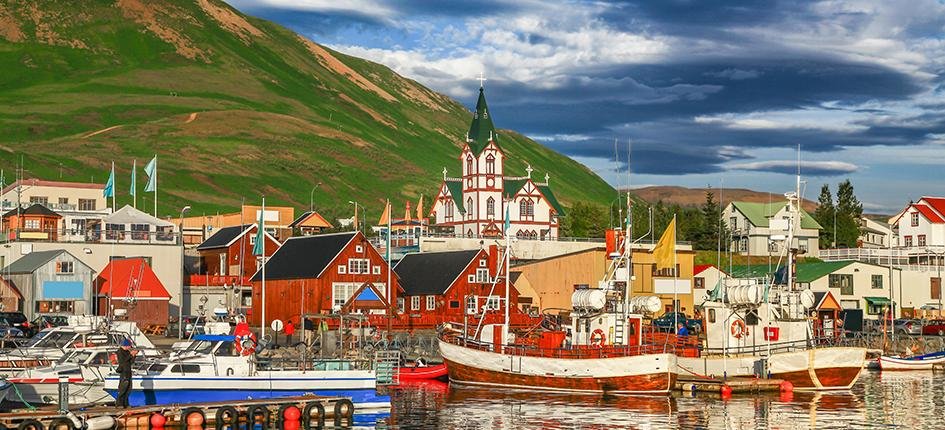
On the occasion of International MSME Day, the India SME Forum brought together policymakers, diplomats, and entrepreneurs to deliberate on global market access and innovation-driven growth. Speaking at the conclave, Rahul Chongtham, Commercial Counsellor at the Embassy of Iceland in India, offered compelling insights into why Iceland could be an attractive and strategic partner for Indian MSMEs looking to expand globally.
Location as Leverage
Rahul began by demystifying Iceland’s geography, often overlooked in Indian business circles. “Iceland is located in the mid-Atlantic, between two major markets—North America and Europe,” he explained, noting that all major European capitals are just 2 to 3 hours from Reykjavik, while New York is about 5.5 hours away. Though no direct flight currently connects India and Iceland, he highlighted a recent milestone: “On 2nd June, Icelandair and Air India signed a codeshare agreement that will connect Indian cities like Delhi and Mumbai to Reykjavik via 15 European destinations.” The agreement opens up not just business routes but also opportunities for Indian travellers to stop over in Iceland, be it for tourism or professional engagements.
New Trade Architecture: TEPA and EEA
One of the key highlights of his address was the focus on two strategic trade agreements that offer Indian companies unparalleled access to European and transatlantic markets. The first, signed in March 2024, is the India-EFTA Trade and Economic Partnership Agreement (TEPA), which links India with four high-income nations: Iceland, Liechtenstein, Norway, and Switzerland. “This is not your conventional FTA. It’s a new-generation agreement that covers trade, investment, and job creation,” Rahul emphasised. “EFTA countries have committed to investing $100 billion and creating a million direct jobs in India over the next 15 years.”
He added that under TEPA, 99.6% of India’s exports to EFTA countries and over 95% of EFTA’s exports to India are now tariff-free or preferentially treated, creating real, accessible opportunities for SMEs.
Equally important is the European Economic Area (EEA) Agreement, which connects Iceland and two other EFTA states with all 27 EU countries. “This means Indian companies based in Iceland will enjoy full access to the EU’s internal market—free movement of goods, services, people, and capital,” he said, positioning Iceland as a viable launchpad into the wider European ecosystem.
Green Energy and Climate Collaboration
Turning to Iceland’s sustainability story, Rahul spoke with conviction about the island nation’s expertise in renewable energy. “Iceland runs on 100% renewable electricity—30% geothermal and 70% hydroelectric,” he stated. This green energy backbone supports nearly every aspect of Icelandic life and industry. “Almost 90% of Icelandic homes are heated using geothermal energy. We’ve been harnessing this source for over 100 years.”
He detailed its diverse applications: from space heating and agriculture to tourism, aquaculture, greenhouses, and even mineral extraction. Notably, India’s own geothermal potential is immense. “We’re working on geothermal projects in Himachal Pradesh, Uttarakhand, Ladakh, and Northeast India,” Rahul shared. In Kinnaur, Himachal, they are already developing cold storage solutions for apple farmers using geothermal heating. “The hot springs in the region can be tapped for heating, cooling, and even electricity generation.”
Carbon Capture: Turning Emissions into Opportunity
Rahul also introduced Iceland’s pioneering work in carbon capture and utilisation, a domain ripe for Indian collaboration. “Our companies are turning carbon dioxide into stone—mineralising emissions into basalt rock formations. India’s Deccan Traps have similar geology,” he noted. He described a second technology—transforming CO₂ emissions from thermal power or cement plants into methanol, which can be used as fuel. “And because all this is powered by green electricity in Iceland, the cost is competitive and you can even earn carbon credits.”
Innovation and Startups: A Natural Synergy
Positioning Iceland as a like-minded partner for India’s vibrant startup ecosystem, Rahul highlighted sectors ripe for synergy: fintech, education tech, medical devices, and creative industries like VFX and gaming. “Our med-tech startups are producing everything from prosthetics to diabetes screening devices,” he said, pointing to companies like Protesis. Iceland’s food tech and marine biotech companies, especially those working with omega-3 oils and collagen from seafood, also offer promising avenues for co-development.
Tourism and Film: A Natural Set for Cinematic India
Tourism is not just an economic pillar for Iceland—it’s also a creative canvas. “The number of tourists we receive is five times our population,” Rahul said. Whether it’s the midnight sun in summer or the northern lights in winter, Iceland’s surreal landscapes attract global visitors. “We’re known as the land of fire and ice—volcanoes, glaciers, waterfalls, geysers—it’s all within hours of reach.”
He added that Indian cinema has already discovered Iceland’s cinematic charm. “A Dilwale song was filmed here. We’re now coordinating with a Kannada film crew who’ll be shooting in Iceland shortly.” Incentives like a 35% production rebate on film projects make Iceland an ideal location for Indian filmmakers.
Sustainable Fisheries and the 100% Fish Model
Perhaps the most innovative revelation of the day was Iceland’s approach to fisheries—a model of sustainable and total utilisation. “We’ve moved beyond just catching fish. We use 100% of the codfish—from the meat to making leather, health supplements, omega-3 oils, and cosmetics,” he explained. “This is what we call the 100% Fish Project.”
With India already being one of the world’s top seafood exporters, Rahul suggested that Iceland’s circular economy model could be adapted for Indian coastal regions. Iceland’s Ocean Clusters, where over 70 marine-related companies collaborate to innovate, could inspire similar hubs across Indian ports.
Looking Ahead: An Invitation for Collaboration
Rahul concluded with an invitation to Indian entrepreneurs: “Iceland may be a small country, but we offer big solutions—especially for MSMEs seeking to scale, innovate, and go green. Whether it’s renewable energy, carbon capture, film production, or biotech—our doors are open for collaboration.”
Leave a Reply